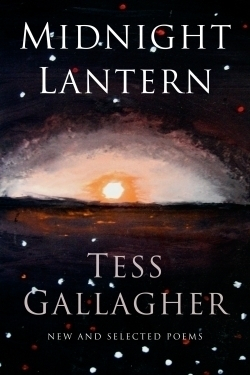Midnight Lantern
New and Selected Poems
“You write in your time. You are of that time,” said Tess Gallagher in a 1999 interview. She was speaking of her 1976 award-winning Instructions to the Double, often lauded as showcasing a woman’s voice published when women were finding their voices; Gallagher’s work continues to speak to her life and time.
Poet, essayist, short story writer, and translator, Gallagher is a writer of considerable emotional and technical range and an enduring voice in American letters. Recipient of numerous honors, including Guggenheim and National Endowment for the Arts awards, she has published several books. Midnight Lantern selects the best from earlier collections and adds thirty new poems.
Gallagher’s life itself seems a poetic creation: born in 1943 to Pacific Northwest loggers, a childhood described as “hardscrabble,” poetry study with Ted Roethke, marriage to the late writer Raymond Carver. She is now the savvy curator of Carver’s legacy, a resident of the US and Ireland, a breast cancer survivor, and a lively and fearless spirit.
Her poetry reflects the many facets of her life: global, local, and intimate histories. For the sweep and irrepressible quality of her life and love alone we should read her work. The poems are varied and satisfying: direct, but drenched in symbols; emotionally accessible yet restrained. New poetry readers may find that some poems wander far into private code, but the emotional center is always sound. Gallagher has an affinity for the magical and the mysterious, but she lives and breathes with ordinary folk. In “Jealous,” she helps a friend name what stymies him: “I studied the riddle with him briefly, / then, handing him the rake, / said the mysterious word aloud: / intimacy.”
Grande dame or fairy godmother, Gallagher serves as wise guide, recording her passage through a full life, and calling the names of things back over her shoulder.
Her new poems are washed in the shadows of ghosts and loves, “brushed by the cool / underground of presence.” But for all her losses, Gallagher is alive to the wonders of new foals and long friendships; “like a bee inside a foxglove,” she notes pleasure where she finds it.
“Contraband” remembers a late-night encounter with a magician her father has dragged home. The head, she writes, is “a corridor for marvels,” but the true marvel is standing hand-in-hand with her father, connected and wondering. As the title poem advises, light never wholly dispels our ghosts, but “shakes a chasm of passage / into night.” And if life is most like “some accomplished falling” then it is bound and “held by the reverberative membrane of love.”
Reviewed by
Teresa Scollon
Disclosure: This article is not an endorsement, but a review. The publisher of this book provided free copies of the book to have their book reviewed by a professional reviewer. No fee was paid by the publisher for this review. Foreword Reviews only recommends books that we love. Foreword Magazine, Inc. is disclosing this in accordance with the Federal Trade Commission’s 16 CFR, Part 255.

